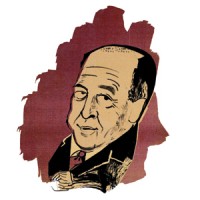A Noble Imagination: Sir Walter Scott’s Waverley, by James P. Bernens
If you would wish for your children to garner a love and fascination for the good things of God’s Creation, if you would have them embrace adventure, cherish what is noble, honor the poor, and attain to a sincere civility and gentleness, let them read from the works of Sir Walter Scott.
Born in 1771 in the city of Edinburgh, Walter Scott came of age in a century that had seen the uneasy political union of the kingdoms of England and Scotland, and was about to see the upheaval of the American and French Revolutions. Drawing from the deep well of British and medieval history, Scott established himself as one of the premier poets of his age, and one of the finest pure storytellers the English language has ever seen. His first novel, Waverley, remains once of his best, although it is less recognizable to modern readers than many other excellent titles like Ivanhoe and Rob Roy.
First published in 1814, Waverley is a lovely and heroic tale which follows the journey of young Edward Waverley, an impressible English gentleman and army officer, who is posted to duty in the tumultuous scene of eighteenth-century Scotland. Mindful of the old Royalist history of his own family, and carried on a string of fate that brings him into league with a Highland clan, Waverley becomes embroiled in the 1745 “Jacobite” rebellion, which seeks to replace Britain’s King George with the exiled Catholic Stuarts. If this chapter of British history sounds obscure, the reader may be comforted to know that much context is incorporated into the fabric of the story by the keen antiquarian mind of Sir Walter Scott himself.
More than anything, Waverley evolves into an adventurous ramble through the genteel courts and fearsome wilds of Scotland and England. There are portions of the novel which simply cannot be forgotten: as when Waverley stands enchanted by the Gaelic music of beauteous Flora Mac-Ivor; or when the rash hero suddenly finds himself pledging his sword in the service of the charismatic Jacobite leader, Bonnie Prince Charlie; or when the great Catholic Highland chieftain, the Vich Ian Vohr, manfully meets his end with the laughing phrase, “This is well got up for a closing scene.”
But the excellence of Waverley extends beyond the many opportunities for suspense and enjoyment which it affords the reader. Like much else that Scott wrote, it provides a lesson in poetry and healthy imagination, and reassures the observant mind of the goodness of the age-old morals. It was this quality in Scott’s writing which drew the special admiration of another venerable Briton, the famous Catholic convert John Henry Newman. In 1839, six years before his conversion to Rome, Newman wrote:
During the first quarter of this century a great poet [Scott] was raised up in the North, who, whatever were his defects, has contributed by his works, in prose and verse, to prepare men for some closer and more practical approximation to Catholic truth. The general need of something deeper and more attractive than what had offered itself elsewhere, may be considered to have led to his popularity; and by means of his popularity he re-acted on his readers, stimulating their mental thirst, feeding their hopes, setting before them visions, which, when once seen, are not easily forgotten, and silently indoctrinating them with nobler ideas, which might afterwards be appealed to as first principles.
Newman saw in Scott’s writing—of which Waverley is a foremost example—an excellence and superiority that helped move men’s minds towards a healthy Christian culture. For the same reason, Dr. Russell Kirk, writing in 1993, esteemed Sir Walter Scott as one of his ten exemplary conservatives in the history of Western Civilization.
Now, after all this has been said, you might be moved to ask: “If this is true, why have I heard and seen so little of the books written by this eminent Scotsman?”
Read the complete article in Crisis Magazine
What is a rich man, by Theodore Dalrymple
“The rich man is he who has enough to meet his desires and who, moreover, exercises control over his desires so that they do not expand indefinitely to torment him with dissatisfaction when they are not fulfilled.”
Theodore Dalrymple
Published in The Salisbury Review, Autumn 2013
Underrated: C.S. Lewis, by Judith Wolfe
Children’s books and popular presentations of Christian belief are what C.S. Lewis, who died 50 years ago this month, is best known for. But what makes him a favourite for earnest Christians’ christening and confirmation gifts — undaunted supernaturalism and doctrinal conservatism combined with an enticing rhetoric of certitude — makes him distasteful and a little suspicious to us intellectuals: “Mr Lewis is always clever” is the usual snub in Oxford Senior Common Rooms.
A.N. Wilson, in what is still the most widely read biography of Lewis, tries to dispel the magic by meticulously mapping Lewis’s intellectual development onto a well-worn Freudian chart of childhood trauma, repressed sexuality and frustrated ambition. But the diagnoses don’t really stick. There is no doubt, for example, that his mother’s death from cancer when he was nine left an indelible mark on Lewis’s psyche and imagination; but his responses to this and other blows were never obvious or merely reflexive. Indeed, one of the things that make Lewis remarkable is that, exactly contrary to Wilson, he never allowed experiences to become determining causes of his actions or convictions, but actively took hold of them as occasions for learning and, not least, self-questioning. The outcomes of such reflection were often unexpected, and Lewis accepted their consequences with uncompromising honesty.
One such conclusion was his conversion. The deaths first of his mother and then of his friends on the battlefields of the Great War aroused in the aspiring young poet a deeply felt and perfectly commonplace rage against a tyrannical God: “Come let us curse our Master ere we die, / For all our hopes in endless ruin lie. / The good is dead. Let us curse God most High,” Lewis wrote in his cycle of war poems, Spirits in Bondage, with all the consternation of Wilfred Owen or A.E. Housman. But probing further, he realised that it didn’t work — not because his protest was ineffectual but because it was incoherent. Richard Dawkins captures the reason well. When, at a 2012 podium discussion between Dawkins and Rowan Williams, an audience member asked tremulously what to make of the tragedy of an innocent child’s death, Dawkins shrugged that he could see here no puzzle or tragedy, but only an instance (sad perhaps for the mother, but unremarkable in itself) of the evolutionary principle of natural selection. Lewis came to the same conclusion: without God, there is no problem of evil. We may certainly ask, “If God exists, why does he allow evil?” — but we cannot answer that there is no God, or that he is a “brute and blackguard” morally inferior to any ordinary human, without also giving up our own sense of the outrage of evil. For if there is a creator God at all, then human reason, desire and moral intuition have their source in Him no less than the material world does; and if there isn’t, then any moral standard available to us can only derive from the same material processes that govern evolution, and so cannot ground the sort of outrage at the world’s futility that is irreducibly experienced as unconditional and absolute rather than merely relative and practical.
Read the complete article in Standpoint
Galbraith truly deserved to be called a ‘public intellectual’
“Galbraith truly deserved to be called a ‘public intellectual’; he was never as barmy as Chomsky nor as nasty as Hobsbawm, never as bitter as Said nor a buffoon like Lacan but he qualified to be included in that opprobrious category.”
Christie Davies
Published in The Salisbury Review, Autumn 2013
Bertrand de Jouvenel: Forgotten Conservative, by Bruce Frohnen
In the disaster for humanity that was the 20th Century, dominated by the murderous dreams of collectivist ideologies and the unrestrained lust for power and the knife, those who loved liberty, be they conservative, libertarian, or “classical liberal,” recognized their common cause: opposition to ever-expanding state power. T.S. Eliot, Christopher Dawson, and Russell Kirk sought to redeem the time through recovery of our understanding of the spiritual bases of culture, and the cultural bases of ordered liberty. They were joined, in the economic sphere, by the likes of Wilhelm Roepke, but also by more secularist, market-centric thinkers like F.A. Hayek, who warned of the false appeal and disastrous consequences of following the Road to Serfdom. Yet, this sometimes uneasy partnership of defenders of cultural renewal and economic liberty included figures who sought to bridge the gap between cultural and economic thought. Such a one was Bertrand de Jouvenel, a conservative political thinker of great importance, whose writings from the middle to the second half of the 20th century deserve a wider audience than they receive.
In important works of political thought, including Sovereignty, On Power, and The Pure Theory of Politics, and also in works and essays dealing with economics and questions of how best to approach problems of public policy, Jouvenel made clear the tendency of the modern state to swallow the rest of society, and the individual with it. Ironically, Jouvenel observed, what made the state so dangerous in modern times was precisely what to most people gave to it its legitimacy: democracy. To many, this recognition of the dark side of democracy rendered Jouvenel’s thought suspect, at best. But his point was not that rule by consent is intrinsically wrong or unjust. Rather, it was that we should recognize the proper limits even of the people to act according to their will, and that such recognition is all the more important in democratic times. From recognition of the importance of the consent of the governed, modern democracy moved to the assumption that governments are legitimate to the extent that they serve the unmediated will of the majority led. Relatively early on, this overemphasis on the normative status of The People (too often little more than an abstraction) led to the common assumption that whatever a democratically elected government did was, by definition, right and just. One need only consider the French Revolutionary Reign of Terror and its claim to act for the people to see the wisdom of Jouvenel’s warning.
In a collection of lectures published as The Ethics of Redistribution, Jouvenel showed how false belief in the power of the majority to achieve a just, fair, and (especially) equal society could succeed only in feeding the Minotaur—that monstrous combination of man and beast that the modern state had become. Thinking, wrongly, that the rich had kept for themselves sufficient wealth to satisfy the needs of all, the people for generations have voted for governmental policies aimed at “redistributing” that wealth so as to meet the needs of the poor. Unfortunately, Jouvenel points out, even if one were able to confiscate all the rich had in their possession, the sum would not come close to meeting the needs of even the poorest. Thus, Jouvenel argued, the wealth “transfer” had not been, and could not be, from the rich to the poor, but rather from most of society to the state. Various programs aimed, in theory, at enriching the lives of the poor would be funded from a general tax, taking money from most people so that the government might spend it on those it deemed worthy or in need. From attempting to provide subsistence to the hungry and the cold, the state quickly moved on to funding various ideological projects, including wasteful forms of subsidized insurance and educational programs and artistic endeavors of highly questionable value, as it built an expensive administrative apparatus to determine how much to give to whom. In this manner the state became increasingly powerful and independent of any check or oversight, even as it maintained the guise and the rhetoric of a mere servant of the people.
Read the complete article in The Imaginative Conservative




